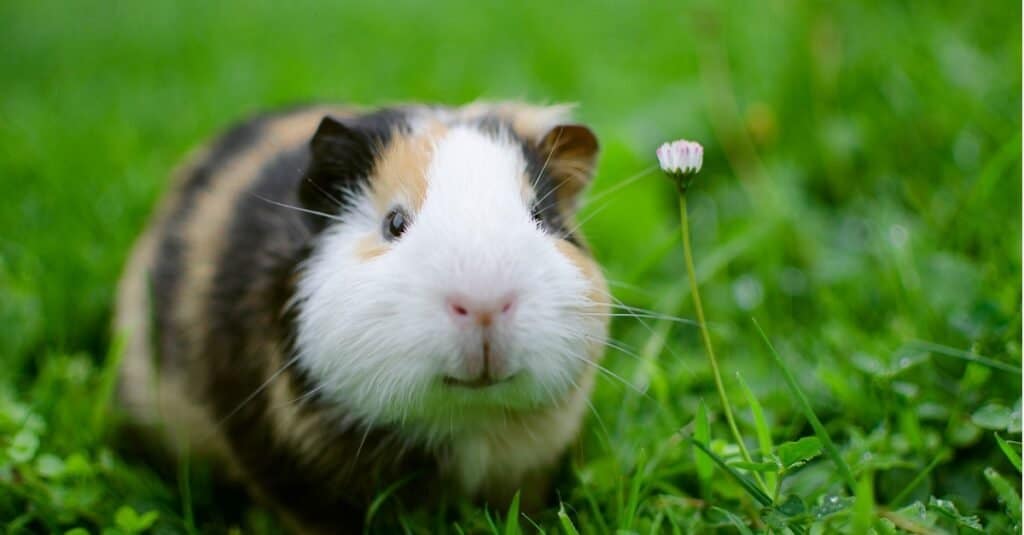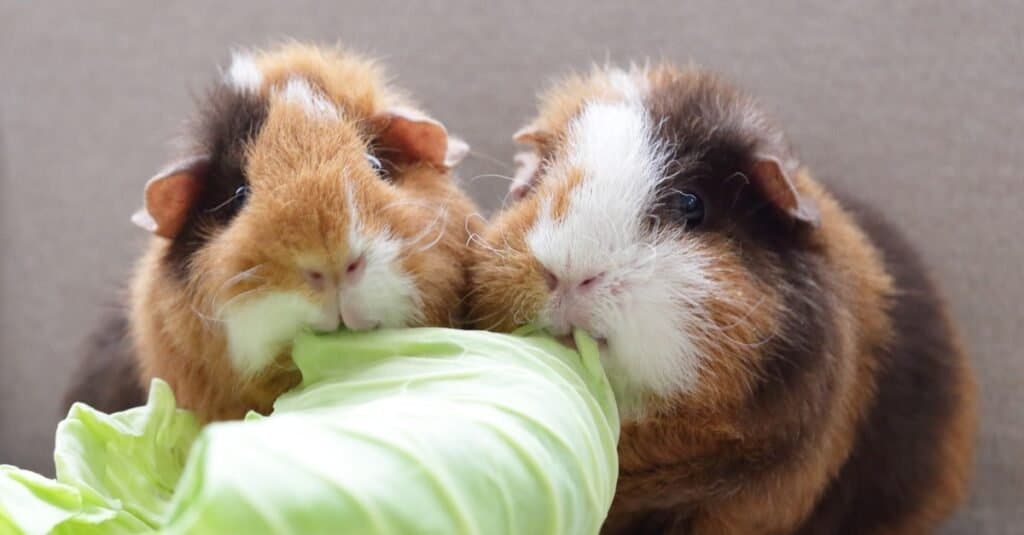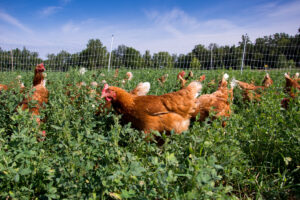If you are interested in having a guinea pig as a pet, there are some things to keep in mind. Consider this your Guinea Pig Pet Guide, with all of the information you need to seamlessly welcome your new family member into your home.

Before Buying A Guinea Pig: 3 Main Consideration
Time: Making the decision to adopt a guinea pig should not be taken lightly. Owning one of these animals is a long commitment since they can live to be over 7 years old with the right care. Before they ever come home with you, you need to set up a habitat in a big enough space that they have plenty of room to roam.
Space: The biggest mistake that new owners make is trying to buy a cage that is too compact. On average, the guinea pig should have a space of 7.5 square feet, which is about 30-by-36 inches. However, if you can afford a larger space, that would be much better. You’ll also need to stock up on all of their feeding supplies, bedding, toys and more.
Once you’re committed to owning a guinea pig and you have gathered all of the necessary supplies, it’s time to bring your new pet home. Guinea pigs are social creatures, so you may even want to budget for multiple guinea pigs, also called cavies, at once. Pet stores are the most common places where you can adopt one of these pets, but speaking with a breeder who has specific experience with cavies is best. Additionally, speaking to breeders who focus solely on specific guinea pig breeds is worth considering if you have your heart set on a specific breed. Make sure to do your research on the local breeders in your area before making a commitment. And also check out this article on 7 great places to adopt a guinea pig.
RELATED: Great Boy and Girl Names For Your Guinea Pig
Budget: Also, consider your current budget. Is adding a guinea pig to your home an affordable option for you? The initial cost is about average for any pet, costing about $200 for a good enclosure, the initial bedding and food, and other supplies. Then, it should cost about $40 each month to maintain them. They need enough space in their enclosure to play and run, but they are still great options for people who have a smaller home.
How Much Does a Guinea Pig Cost?
The cost of a guinea pig is the total sum of multiple factors, like their adoption fee, monthly maintenance, healthcare, and more. Their initial adoption fee is usually around $40, though there are breeders and rescues that charge much higher or lower prices. Check locally to find an adequate price from a reputable source.
Before you bring your guinea pig home, you’ll need to spend the time and money for an enclosure. Depending on the features you want, expect to spend about $200 for the space, factoring in the cost of bedding, toys, and other accessories that you want in their cage. They’ll also need food, hay, a water bottle, and vitamin C droplets. Though you can typically buy in bulk to save on the cost, the average monthly cost is about $40 for their food and vitamins, depending on the source.
New Owner Shopping List: What To Buy
Before you ever bring your guinea pig home, you need to make sure you set the space up with everything they’ll need. These supplies include:
- Guinea pig enclosure: Even though a guinea pig is usually just 8-11 inches long, you need to plan an enclosure that is no smaller than 36” (L) x 30” (W) x 18” (H), and it should be escape-proof. This hutch can be bigger, but it shouldn’t be smaller. Here are the best guinea pig cages, reviewed and ranked.
- Bedding: The bottom 1-2 inches of the enclosure should be filled with bedding. You can choose hardwood shavings, paper bedding, or something else that is soft for their small and delicate feet.
- Hiding places: As social as the guinea pigs are, they feel safest when they can hide away from the world somewhere. This hiding place is most likely going to be their place to sleep, play, and eat. You can choose large hollow wood houses, or you can choose a soft bed. However, they all should be cleaned regularly to reduce the smell of guinea pig urine, feces, and hair.
- Water bottle: Like all living creatures, guinea pigs need water for life. Therefore, you’ll want to get a water bottle that can be easily access via your pet’s home. Here are the best guinea pig water bottles on the market.
- Toys: Chewable toys are an easy way for guinea pigs to keep their teeth growth under control.
RELATED: Guinea Pig Teeth — Everything You Need to Know
Ongoing Needs: What You Need to Care For Your Guinea Pig
Your guinea pig needs a regular supply of food, bedding, and more to keep them satisfied on a daily basis. After you have the enclosure set up, you’ll need to remember to buy these supplies on a regular basis.
- High-quality guinea pig pellet food: These pellets are a staple of a guinea pig diet. Make sure to find a source that has vitamin C because cavies cannot product it on their own. Here are the best guinea pig pellets on the market.
- Timothy hay: This hay helps with digestion and reduces how much the teeth grow.
- Chew sticks: Guinea pigs constantly need to chew to keep their teeth short. The use of chew sticks is one of the easiest ways to control their teeth length.
- Fresh water: Change out the water in the guinea pig’s water bottle every day. Depending on how many guinea pigs you have, you might need to replenish the water multiple times a day.
- Fruits and vegetables: Though supplementing with vitamin C is beneficial, having fresh produce that is low in sugar is a necessity.
- Treats: There are plenty of healthy treats for guinea pigs. However, restrict the treats to no more than 10% of their daily diet.
Ongoing Care
While a guinea pig can get exercise without any help from its owners, it requires regular veterinary visits and grooming to stay healthy. Guinea pigs are considered to be an exotic pet, so you should seek out a vet that has experience with these types of rodents. Routine appointments each year ensures that you have a clear view of their health at all times.
Grooming includes many responsibilities, like trimming their nails and brushing their coat. While guinea pigs should have enough chew toys to take care of their teeth, their nails constantly grow without any way to keep them up on their own. Trimming with nail clippers is necessary, though a vet might be able to help you if necessary. If you want to tackle this chore yourself, here’s how to trim your guinea pig’s nails.
Since guinea pigs spend the majority of time in their enclosure, it needs to be properly cleaned. Put a reminder on your smartphone or calendar to completely disinfect their home every week, using a solution with no more than a 3% concentration of bleach. Thoroughly rinse and dry every surface so there is no cleaning residue left behind. Bedding should be changed out twice weekly if needed.
RELATED: How to Tell if Your Guinea Pig is Pregnant
Most importantly, interact with your guinea pig (or pigs). They become familiar with you by continual exposure. Spend time with them by feeding them periodic treats and letting them get familiar with your smell. While some guinea pigs prefer never to be held, enough TLC might make them more willing to spend some time cuddling.
Feeding Your Guinea Pig
The biggest part of caring for your guinea is to feed it properly. Guinea pigs eat a lot during the day, but they need different amounts of everything. Generally, their diet consists of fresh produce, timothy hay, and pellets, but you can find a complete guide to the guinea pig diet here.
Fresh produce – i.e., fruits and vegetables – can be freely given to them in unlimited amounts for the most part. Fruits that are high in sugar should be a little more limited because it can cause digestive issues and high blood sugar. However, vegetables should be safe in any quantity. Pellets should be provided twice daily, but any remaining amount should be removed within one hour if they haven’t eaten it.
You also need to supply them with constant fresh water. If the water runs out, fill it back up! While tap water should be perfectly safe, some people prefer to use bottled water instead.

How Long Will Your Guinea Pig Live?
Unlike other rodents, the guinea pig lives for quite a while. The average lifespan is about 4-8 years with the right care, though this guinea pig lived nearly 15 years! Some sources say that this lifespan is a smaller range at just 5-7 years. However, proper veterinary care is a necessity to make sure it gets close to this time. Guinea pigs are exotic pets, which means that you’ll need to find a local veterinary center that can provide them with the necessary care.
Like many exotic pets, guinea pigs are prone to certain health issues that can reduce the lifespan. While regular vet visits should catch many of these concerns, keeping an eye on your pet will tell you if there is any reason to worry. If the guinea pig starts to lose their appetite, has poor output with their urine or feces, has a fever, starts breathing wrong, or even has a dull coat, get help quickly.
RELATED: Discover the Largest Guinea Pig on Record
Common Health Issues For Guinea Pigs
Guinea pigs can suffer from many health issues, but one of the most common concerns is scurvy, which is due to a lack of vitamin C. Luckily, this problem can be prevented by consistently giving them a vitamin C supplement in their water or by giving them fruits and vegetables in their diet. However, if you give them produce with too much sugar, they are prone to diarrhea.
Urinary problems, parasites/mites, and related skin issues can also be a problem. Often, guinea pigs only suffer from mites when they are exposed in their habitat, which can happen with breeders that have many guinea pigs to care for. The only way to treat mites and parasites is with ivermectin, which can be procured from a vet with proper diagnosis. Another issue is bladder stones. Here is everything you need to know about dealing with bladder stones in guinea pigs.
Where to Buy Your Guinea Pig
Buying a guinea pig is fairly easy. There are no specific qualifications necessary to adopt one, but you’ll need to visit a shelter, a rescue, or a breeder. Though they might need some form of identification, you’ll likely only need to bring payment and sign some paperwork. Bring a travel cage or a temporary pet carrier to bring them home.
Special Considerations With Guinea Pigs
When you adopt one guinea pig, consider adopting a second one as well. Guinea pigs are incredibly social creatures, and having this consistent interaction is necessary for their mental health. Even if you intend to spend a lot of time playing with your guinea pig, they can become lonely, depressed, and sick when they don’t have a companion from the start. These animals are herd animals, so having two or more is a great way to keep them happy.
If you need to separate this duo (or trio) in any situation, they might suffer emotional damage. Putting them together can be a lot of responsibility, but most guinea pig owners also says that it is more fun. With someone familiar around them, especially at the beginning, their personalities shine and become much more playful and active.
While you might be concerned that you’ll end up spending tons of money to adopt more than one guinea pig, that isn’t necessarily true. In fact, the total price will only go up by about 25% because you only need one enclosure. You don’t need to account for extra bedding or cleaning. All you need is more food!
Guinea Pig Pet Guide: Everything a Pet Owner Needs To Know FAQs (Frequently Asked Questions)
How do I go about buying a guinea pig?
Start by visiting a local animal shelter or a guinea pig rescue. While a breeder might be a tempting start, visiting one of these businesses pushes them to keep breeding more pups, rather than urging consumers to buy baby and adult guinea pigs that already need a home.
What is a good price to buy a guinea pig?
The average price to adopt a guinea pig is between $25 and $50, whether it is from a breeder, rescue, or pet store. The price isn’t indicative of quality, but you should do your research to make sure that the baby guinea pig comes from good genetics, if possible.
What is the safest way to buy a guinea pig?
Even though it is tempting to go to a pet store to adopt a guinea pig, it is best to find a local rescue or animal shelter to adopt them from. Rescues and shelters have a different standard of care because there are experienced individuals who know how to care for them properly.
How old should a guinea pig be for adoption?
Females and males should be separated from their mothers at different times. While female pups can stay with their mother for 4 weeks, males should be separated by the time they are 3 weeks old. Guinea pigs are very fertile and become sexually mature at an early age, and a male pup can get their mother and sisters pregnant by the time they are three weeks old.
Thank you for reading! Have some feedback for us? Contact the AZ Animals editorial team.




